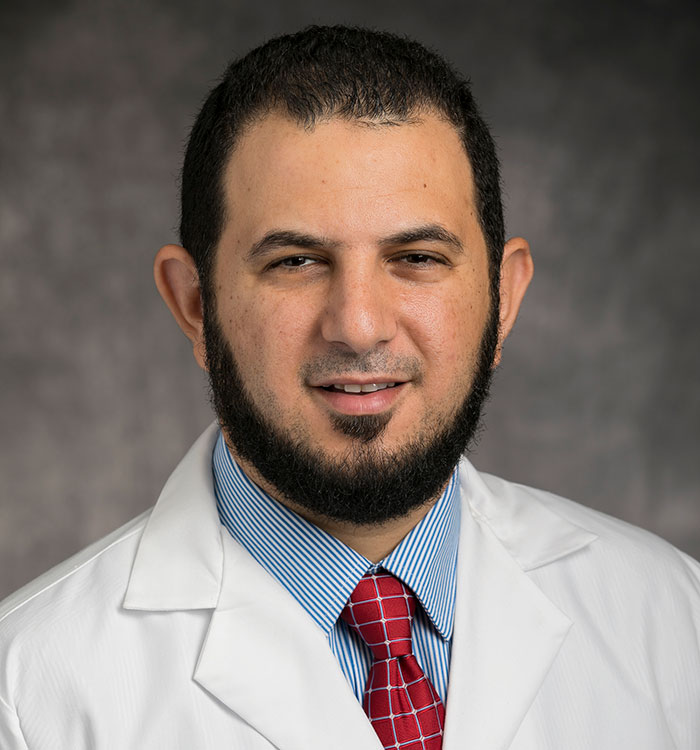Expanded Neuroendocrine Tumor Team at UH Seidman Cancer Center Boosts Access to Clinical Trials
February 06, 2022
Trials of promising anti-angiogenesis therapies under way here
Innovations in Cancer | Winter 2022
A newly expanded team at University Hospitals Seidman Cancer Center devoted to treating the growing number of patients with neuroendocrine tumors is quickly offering these patients access to leading-edge clinical trials, looking to increase options in the most difficult cases and move the needle on improving outcomes.
 Amr Mohamed, MD
Amr Mohamed, MD“We’re adding more and more options, according to every single line of treatment, for different types of neuroendocrine tumors,” says Amr Mohamed, MD, new Director of the Neuroendocrine Tumors Program at UH Seidman Cancer Center. “We want to make sure that every type of neuroendocrine tumor, whether it’s the lung, pancreas, small bowel or another site, will have at least one or two clinical trials in their line of treatment to improve options beyond the standard of care.”
Patients at UH Seidman with advanced pancreatic neuroendocrine tumors, for example, are participating in a Phase 3 trial of multi-kinase inhibitor cabozantinib, a potent inhibitor of pro-invasive receptor tyrosine kinases (RTKs), including AXL, FLT-3, KIT, MER, MET, RET, ROS1, TIE-2, TRKB, TYRO3, and VEGFR-1, -2, and -3. Cabozantinib induces apoptosis of cancer cells and suppresses tumor growth, metastasis and angiogenesis.
Dr. Mohamed says that given the results he’s seen so far, he’s hopeful that the trial will have promising results and will be another option for patients with metastatic gastroenteropancreatic tumors.
“Neuroendocrine tumors are highly vascular tumors, which means a lot of anti-angiogenesis medications have been shown that they’re working and very promising for these cancers,” he says. “The concept has already been working for neuroendocrine tumors. We already have one medication as a standard of care, sunitinib (Sutent), and there are many trials using similar medications that have already shown that they work for neuroendocrine tumors and delay the progression of the cancer, including cabozantinib, and surufatinib. That’s why we now have the Phase 3 trial. We think these are new promising options for neuroendocrine tumors.”
Another trial at UH Seidman Cancer Center enrolling neuroendocrine tumor patients is testing the combination of the investigational immunotherapy tislelizumab with the multi-kinase inhibitor surufatinib. Dr. Mohamed says this, too, is a promising approach.
“Surufatinib has many targets, including the VEGFs and FGFR,” he says. “It has been shown in a Phase 2 and Phase 3 trial that it improves progression-free survival in patients with pancreatic and extra-pancreatic neuroendocrine tumors. In this Phase Ib/II trial, we want to see if adding immunotherapy to this targeted therapy will improve the outcome in our neuroendocrine tumor population. There are a lot trials showing that if you add anti-angiogenesis to immunotherapy, you increase T-cell infiltration and improve the tumor mutational burden. When you improve the tumor mutational burden, we anticipate that the immunotherapy will work better, creating a synergistic effect and better response. This is a Phase Ib/II trial of the same concept and we are eagerly waiting for the final results.
Dr. Mohamed says the UH Seidman Neuroendocrine Tumor Program looks to add even more clinical trials for patients in the coming months. Some will test the role of adjuvant chemotherapy in treating neuroendocrine tumors, while another will examine the safety and effectiveness of combining peptide receptor radionuclide therapy (PRRT) – a mainstay of treatment for neuroendocrine tumors – with a targeted therapy. Another trial involving immunotherapy and a novel compound – specifically targeting high-grade neuroendocrine tumors – is under development, with a goal of starting the trial soon.
With all these trials, Dr. Mohamed says, the goal is for UH Seidman Cancer Center to continue contributing to moving the science of neuroendocrine tumors forward, while giving its patients access to more and better options for care.
“Neuroendocrine tumors used to be known as rare tumors and didn’t have a lot of options of treatment, but in the last 20 to 25 years, there’s been a seven to eight-fold increase in their numbers, with more options of treatments than before” he says. “The options that we have need more improvement in both response rate and overall outcomes, especially for patients with small bowel neuroendocrine tumors and high-grade tumors. That’s why it’s important to have clinical trials to improve the standard of care that we currently have.”
In addition, with help of patient advocates, Dr. Mohamed has recently established an organization for neuroendocrine tumors patients in Ohio called ONETS (Ohio Neuroendocrine Tumor Society). This is an Ohio-based support group for the NET community. Composed of NET patients, families, caregivers and doctors, its goal is to help and support for patients with neuroendocrine tumors in Ohio and across the nation.
The Neuroendocrine Tumor Program at UH Seidman Cancer Center is convening a 2022 Neuroendocrine Tumor Symposium on Saturday, March 12. This free virtual event for patients, families and caregivers will provide information on the treatment options for neuroendocrine tumors and related diseases, the latest information on clinical trials, and advances in research. Please share the registration link below with patients and families who may benefit.


